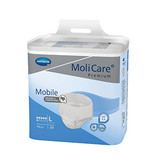
The Caregiver Guide - Providing End-of-Life or Palliative Care
End-of-life or palliative care focuses on providing support, comfort, and compassionate care to individuals in their final stages of life. During this delicate and very important phase of a patient’s life, the caregiver’s role becomes paramount in ensuring they receive the physical, emotional, and spiritual support they need.
According to a research paper by Professor Kathy Eagar of the University of Wollongong in Australia and others, end-of-life and palliative care significantly improves the quality of life before death. The study measured the change in symptom distress in over 25,000 patients. Improvement was reported in every case, and 85% had no severe symptoms before death.
One of the key responsibilities of a caregiver in end-of-life or palliative care is to provide physical support. This includes assisting with daily activities such as bathing, dressing, feeding, and administering medication. Additionally, caregivers often collaborate closely with healthcare professionals to ensure that pain management strategies are in place to alleviate any discomfort or distress experienced by the patient.
However, being a caregiver goes beyond just attending to physical needs. It also involves offering emotional support during this difficult time. Caregivers must possess empathy and understanding as they navigate conversations about fears, regrets, or unresolved issues that may arise for patients nearing the end of their lives.
Caregivers also play an essential role in facilitating communication between patients and their families or healthcare providers. They advocate for the patient's wishes regarding medical treatments or end-of-life decisions while ensuring that all parties involved are well-informed and have a clear understanding of the situation.
Understanding the Physical and Emotional Needs of the Terminally Ill
Understanding the physical and emotional needs of the terminally ill is crucial in providing comprehensive care during their final stages of life. Palliative care aims to address these needs by focusing on pain management, emotional support, and comfort measures.
· Pain management helps to ensure that individuals with terminal illnesses experience minimal discomfort. This involves using medications, therapies, and interventions tailored to alleviate physical pain and improve overall quality of life.
· Emotional support helps to temper the emotional toll that can be overwhelming for both patients and their loved ones. Providing a compassionate presence, active listening, and creating a safe space for expression can significantly contribute to their well-being. This support extends beyond medical interventions and encompasses psychological counseling or therapy if necessary.
· Terminal illness often brings about unique challenges that require specific comfort measures. These may include creating a soothing environment through aromatherapy or providing specialized equipment for enhanced mobility or positioning. Each individual's needs should be assessed comprehensively to ensure personalized care that promotes comfort and dignity.
Techniques and Medications for Effective Pain Relief
Palliative care or pain management techniques encompass a variety of approaches that aim to alleviate discomfort. These may include physical therapies such as massage, acupuncture, or heat therapy. Additionally, psychological techniques like relaxation exercises and cognitive behavioral therapy can help individuals cope with pain on a mental and emotional level.
In conjunction with these techniques, the use of pain medications helps to relieve pain effectively. For end-of-life care, palliative medications may include opioids such as morphine or fentanyl, which are carefully administered under medical supervision. The selection of pain management techniques and medications should always be tailored to individual needs and preferences. It should only be done in consulting with healthcare professionals specializing in pain management.
Emotional Support for Patients and Families
Addressing the emotional needs of patients and their families is equally important during these times.
Grief counseling offers a safe space for individuals to express their emotions, process their feelings of loss, and navigate through the stages of grief. Providing a compassionate ear and guidance, grief counselors can help patients and families cope with the overwhelming emotions that arise during this time.
By implementing effective emotional support strategies, caregivers and healthcare providers can create an environment that fosters healing and resilience. These strategies may include open communication channels, creating opportunities for meaningful connections between patients and their loved ones, facilitating support groups or therapy sessions, and providing resources for self-care.
Creating a Comfortable Environment
Whether a person spends their last days at home or in a hospice setting, the surroundings play a significant role in providing peace and solace to both patients and their loved ones. There are several tips that can help create a comforting atmosphere at home. Firstly, ensuring the space is clean, clutter-free, and well-organized can promote calmness. Soft lighting and soothing colors can also contribute to a peaceful ambiance.
Incorporating personal touches such as familiar objects or photographs provides comfort and evokes positive memories. Creating designated spaces for relaxation or reflection, such as cozy seating areas or quiet corners with books or music, can further enhance the overall comfort of the environment.
In hospice settings, creating an atmosphere that promotes tranquility and serenity can be achieved by designing spaces that are aesthetically pleasing with natural elements like plants or artwork. Soft music playing in the background can also contribute to a soothing ambiance.
Communication Strategies for Empathetic and Effective Caregiving
When communicating with terminally ill patients and their families, active listening skills play a vital role. This means giving your undivided attention, maintaining eye contact, and being fully present in the conversation. By doing so, you show empathy and validate their feelings, creating a sense of trust and understanding.
In addition to active listening, effective communication requires using language that is clear, concise, and sensitive. Avoiding medical jargon or complex terminology helps ensure that everyone involved understands the information being shared. Using simple explanations while still respecting the patient's autonomy can significantly enhance communication.
Caregivers should be mindful of non-verbal cues such as facial expressions and body language. These subtle signals can convey empathy or reassurance without words. A gentle touch or a comforting gesture can go a long way in establishing a connection and providing reassurance and comfort.
Discussing Treatment Options and Advance Directives
Talking about treatment options at the end of life can be sensitive and emotionally challenging. Still, it is an essential part of ensuring that individuals receive the care they want or need. Caregivers and healthcare providers must discuss options and plans openly to get a better understanding of a patient's values, goals, and preferences. This allows a more personalized approach to care that aligns with the individual's wishes.
Advance directives conversations are equally important in ensuring an individual's healthcare decisions are respected. These legal documents provide clear instructions regarding medical treatments and interventions, even if individuals cannot communicate or make decisions for themselves. Engaging in these discussions allows individuals to control their future healthcare choices and alleviates potential burdens on loved ones during difficult times.
By encouraging honest conversations about treatment options and advance directives, we empower individuals to participate in their own care planning actively. These discussions foster trust between patients, families, and healthcare providers while promoting patient-centered decision-making. Ultimately, these conversations contribute to more compassionate and personalized end-of-life care experiences for all involved parties.
Building an Emotional Connection and Trust
Caregivers play a crucial role in providing support, comfort, and assistance to needy individuals. Cultivating empathy builds trust and fosters a strong emotional connection. Empathy involves understanding and sharing the feelings of another person. It goes beyond sympathy or pity; it requires caregivers to put themselves in the shoes of those they care for, genuinely listening to their needs and concerns.
Empathy in a caregiving relationship has numerous benefits. Firstly, it helps establish trust between the caregiver and the care recipient. When individuals feel understood and validated, they are more likely to open up about their struggles, allowing caregivers to provide targeted support.
Secondly, it fosters better communication between caregivers and care recipients. By actively listening with compassion and understanding, caregivers can effectively address concerns or fears that may arise during the caregiving process. This open dialogue promotes collaboration and empowers care recipients to participate in decisions regarding their own well-being.
Empathy enhances the overall quality of care provided. Caregivers who practice kindness are better equipped to anticipate the needs of those they care for. They can tailor their approach based on individual preferences or circumstances, ensuring that each person receives personalized attention that meets their unique emotional requirements.
Building or Maintaining Social Connections
Social connection plays a vital role in the well-being of individuals, especially during the end-of-life phase. Caregivers must recognize the importance of fostering social connections for their loved ones to enhance their quality of life. Loneliness and social isolation can have a significant negative impact on a person's emotional and physical health, so caregivers should actively seek opportunities for social engagement.
Organize regular visits from family and friends and encourage them to spend quality time with the patient to provide comfort, companionship, and a sense of belonging. Also, explore community resources such as support groups or senior centers that offer social activities and opportunities for interaction with peers.
Technology is a valuable tool in facilitating social connection, especially for individuals with limited mobility or who live far away from their loved ones. Video calls, social media platforms, and online communities can help bridge the distance and allow for meaningful connections to be maintained.
Managing Spiritual Needs
Spirituality is an essential aspect of many individuals' lives, and it continues to hold significance during the end-of-life phase. Caregivers should recognize and respect the spiritual beliefs and practices of their loved ones, as these can provide comfort, meaning, and a sense of peace during this challenging time.
To address spiritual needs, facilitate access to religious or spiritual leaders who can provide guidance, support, and religious rituals or sacraments as desired. Explore resources such as spiritual literature, music, or art that align with your loved one’s spiritual beliefs. Creating a quiet and peaceful space for prayer, meditation, or reflection can also contribute to a sense of spiritual well-being.
It is important to engage in open and non-judgmental conversations about spirituality with patients. Actively listening and respecting their beliefs can create an environment that allows them to express their spiritual concerns, questions, or desires confidently.
Taking Care of Yourself as a Caregiver
Caregiver burnout is a genuine concern, as the demands of caregiving can be overwhelming and exhausting. Maintaining your own health is key to providing the best possible care to your loved one. By implementing self-care practices, you can prevent burnout and ensure that you can sustain your caregiving role in the long run.
One effective way to avoid burnout is by establishing a solid support network. Reach out to friends, family members, or even support groups specifically designed for caregivers. These networks can provide emotional support, practical advice, and a safe space to share your experiences with others who understand what you're going through.
You should also consider using resources such as respite care services or professional counseling. Respite care allows you to take breaks from caregiving responsibilities while ensuring your loved one's needs are still met. Professional counseling can provide valuable guidance and coping strategies for managing the challenges of caregiving.
You can reduce the “number of balls in the air” by organizing or automating your routine tasks. Setting reminders for medical appointments, using a medication management device and using home delivery for groceries and other regular consumables all take pressure off you and help to reduce the risk of burnout. For more information on looking after yourself and avoiding caregiver burnout, read this article.
For instance, LL Medico’s Autoship feature allows you to schedule delivery of all your adult diapers, diabetic supplies, personal care items and much more. You don’t have to worry about remembering to order every time or about running out of stock unexpectedly. We carry a wide range of quality products at highly competitive prices, and delivery is free in the continental US.
In Closing
The role of a caregiver in end-of-life or palliative care and support goes beyond just medical assistance. It requires empathy, patience, and the ability to provide comfort during difficult times. By being there for individuals and their families, caregivers create an environment of love and understanding that can alleviate fears and anxieties.
The rewards of being an end-of-life caregiver are immeasurable. The gratitude expressed by patients and their loved ones is deeply fulfilling. Knowing that you have made someone's final journey more comfortable and meaningful is an honor that cannot be replicated in any other profession.
While the challenges can be emotionally demanding, the personal growth that comes from providing end-of-life support is invaluable. It teaches us about the fragility of life, the importance of compassion, and the strength within ourselves to offer solace when needed most.
Image by DCStudio on Freeoik.com














































































































































